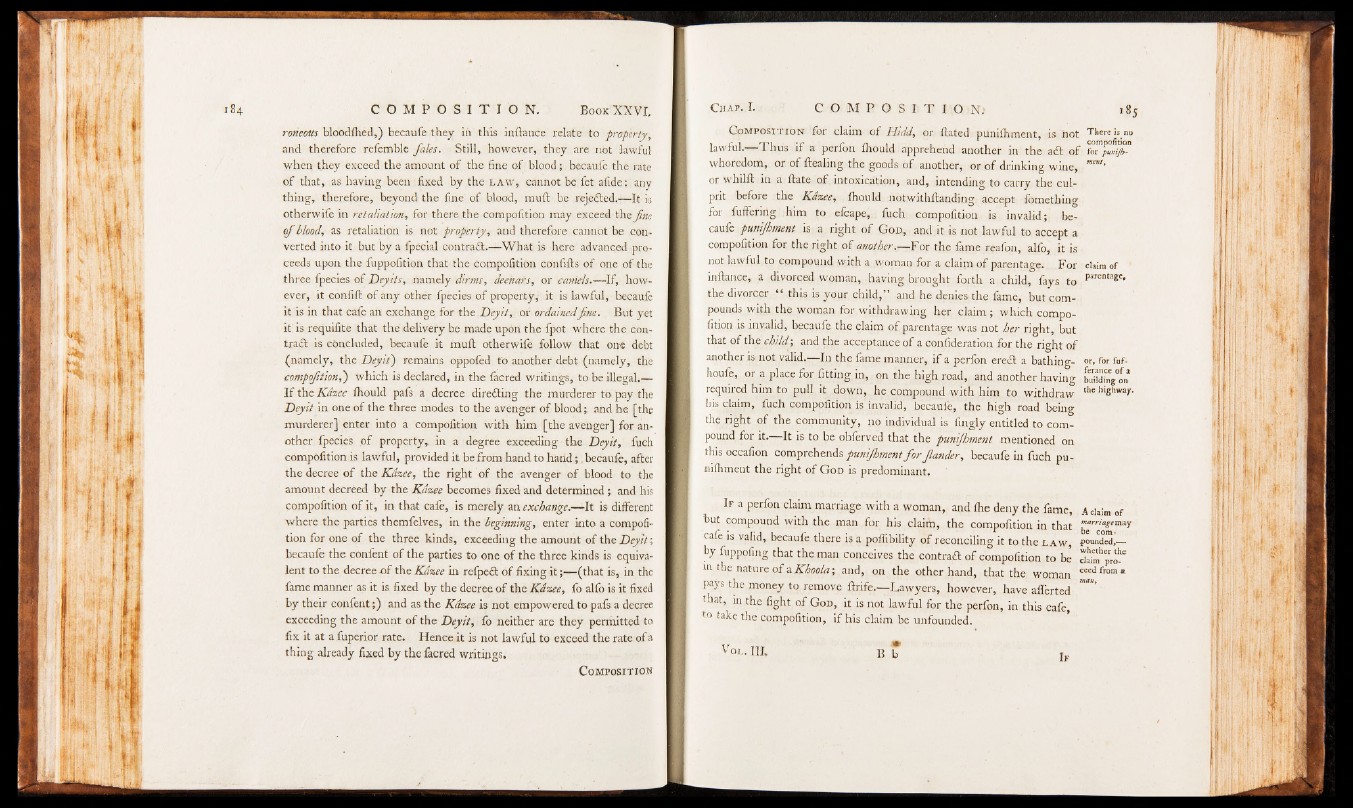
roneous bloodfhed,) becaufe they in this inftance relate to property,
and therefore refemble fates. Still, however, they are not lawful
when they exceed the amount of the fine of, blood; becaufe the rate
of that, as having been fixed by the l aw , cannot be fet afide: anything,
therefore, beyond the fine of blood, muft be rejected.— It is
otherwife in retaliation, for there the compofition may exceed the fine
a f blood, as retaliation is not property, and therefore cannot be converted
into it but by a fpecial contrail.— What is here advanced proceeds
upon the fuppofition that the compofition confifts of one of the
three fpecies of Deyits, namely dirms, deenars, or camels.— If, however,
it confift of any other fpecies of property, it is lawful, becaufe
it is in that cafe an exchange for the Deyit,. or ordainedfine. But yet
it. is requifite that the delivery be made upon the fpot where the contrail
is concluded, becaufe it rnuft otherwife follow that one debt
(namely, the Deyit') remains oppofed to another debt (namely, the
compofition,) which is declared, in the facred writings, to be illegal.—
I f the Kdzee fhould pafs a decree direiling the murderer to pay the
Deyit in one of the three modes to the avenger of bl oodand he [the
murderer] enter into a compofition with him [the avenger] for another
fpecies of property, in a degree exceeding the Deyit, fuch
compofition is lawful, provided it be from hand to hand;, becaufe, after
the decree of the Kdzee, the right of the avenger of blood to the
amount decreed by the Kdzee becomes fixed and determined; and his
compofition of it, in that cafe, is merely an exchange.— It is different
where the parties themfelves, in the beginning, enter into, a compofition
for one of the three kinds, exceeding the amount of the Deyit;
becaufe the conlent of the parties to one of the three kinds is equivalent
to the decree o f the Kdzee in refpect of fixing i t;— (that is, in the
fame manner as it is fixed by the decree o f the Kdzee, fo alfo is it fixed
by their confent;) and as the Kdzee is not empowered to pafs a decree
exceeding the amount of the Deyit, fo neither are they permitted to
fix it at a fuperior rate. Hence it is not lawful to exceed the rate of a
thing already fixed by the facred writings,
C o m p o s i t i o n
Composition for claim of lluid , or ftatedi pumihment, is not
lawful.—Thus if a perfon fhould apprehend another in the a£t of
whoredom, or of ftealing the goods of another, or of drinking wine,
or whilft in a ftate of intoxication, and, intending to carry the culprit
before the Kazee, fhould notwithftanding accept fomething
for fufferiiig him to efcape,. fuch compofition is invalid; becaufe
punijhment is a right of God, and it is not lawful to accept a
compofition for the right of another.— For the fame reafon, alfo, it is
not lawful to cpmpound with a woman for a claim of parentage; For
inftance, a divorced woman, having brought forth a;child, fays to
the divorcer “ this is your child,” and he denies the fame, but compounds
with the woman for withdrawing her claim ; which compofition
is invalid, becaufe the claim of parentage was not her right, but
that of the child; and the acceptance of a confideration for the right of
another is not valid.—In the fame manner, if a perfon ereil a bathing-
houfe, or a place for fitting in, on the high road, and another having
required him to pull it down, he compound with him to withdraw
his claim, fuch compofition is invalid, becaufe, the high road being
the right of the community, no individual is fingly entitled to compound
for it. It is to be obferved that the punijhment mentioned on
this occafion comprehends punijhment fo r Jiander, becaufe in fuch pu-
nifhment the right of God is predominant.
If a perfon claim marriage with a woman, and fhe deny the fame,
but compound with the man for his claim, the compofition in that
cafe is valid, becaufe there is a poffibility of reconciling it to the l aw ,
by fuppofing that the man conceives the contrail of compofition to be
iu the nature of a Khoola; and, on the other hand, that the woman
pays the money to remove ftrife.—Lawyers, however, have afferted
that, m the fight of God, it is not lawful for the perfon, in this cafe,
to take the compofition, if his claim be unfounded.
V ol. Ill, B £ If
There is no
compofition
for punijhment,
claim o f
parentage.
or, for fuf-
ferance o f a
building on
the highway.
A claim o f
marriage may
be compounded,—•
whether the
claim proceed
from a
many